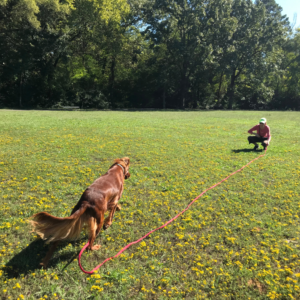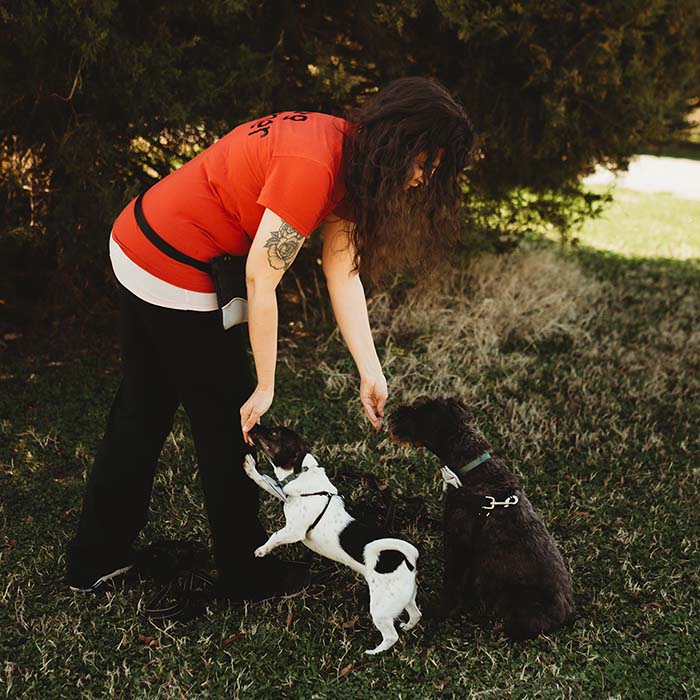They’ll Surprise You: Rescue in Arkansas
A repurposed three-part series
Sierra Laurent finds possums messy but harmless.
She knows that nursing raccoon mothers often forage during the day.
And she’s discovered that there’s nothing more rewarding than watching a squirrel climb to the top of a tree for the very first time.
Sierra is now a certified veterinary technician and certified wildlife rehabilitator, but she has always loved animals. She found her passion early, rescuing a bird from her cat when she was 11. She’d always taken care of sugar gliders and guinea pigs. “I knew at a young age that I had a passion for animals,” Sierra shared. “I’m most successful in those areas where I’m helping animals. I think animals know that. Animals are drawn to me.”
She started her career as a veterinary assistant 10 years ago, earning her certification as a veterinary technician (CVT) in 2017. She began in an exotic clinic, working with small animals. “People would bring in wildlife,” she explained. “I was the one nominated to bring them for the night.”

She first started seeing a more frequent need for wildlife in 2016, and word of mouth spread quickly. “For a while, I wasn’t even listed on the Game and Fish list because I’d get so many phone calls,” Sierra said. “I was able to sustain the volume just from the clinic.”
She started with squirrels. “I developed the passion and desire to move forward with that,” Sierra said. “I took squirrels first. Once I mastered squirrels, I moved onto raccoons and possums from time to time. But I prefer raccoons and squirrels. I like their temperament.”
Raccoons in particular require a lot of stimulation. “Finding techniques and enrichment and toys is really fun for me,” Sierra said. “They’re a lot like children. They’ll surprise you.”
In 2018, she became certified as a wildlife rehabilitator with the Arkansas Game and Fish Commission. “Now, I’m listed publicly,” Sierra shared. “I don’t always take everything I’m called for. We have a group on Facebook, a secret group of rehabilitators. I’ll post on there. We network with one another and that helps a lot. Even today, somebody called up where I work, asking about a raccoon and the lady at the front knew to come get me. They just know.”
As the only rehabilitator in Saline County, Sierra will even get calls from animal control or other clinics. Even so, it’s all volunteer work. “There’s no monetary benefit to me in any way,” she said. “I just love it. I feel like God gave me this gift and I need to use it. It’s rewarding to see wildlife that would otherwise die be returned to their environment. Watching squirrels go up to the top of the tree for the very first time is why I do this. To give that opportunity back to the animal is very rewarding. You can’t buy that. You can’t put a price on it.”
She fundraises to offset the costs, but still spends a lot out of pocket. She’s always looking for blankets, beds, cages, piles of wood, dog toys, canned food, paper towels, potty mats, and cleaning supplies. “I try to get pretty clever, especially when they’re juveniles,” Sierra explained. “If you have it, I can probably use it.”
Plus, there are the vaccinations she provides the animals. But anyone looking to help can reach out on Facebook. “Canned foods, for example, might be spoiled by our criteria but raccoons can still eat it,” she said.
Although Sierra is registered in Saline County, she can help or find a location anywhere in central Arkansas. “Our network is state-wide,” she said. “Game and Fish requires that we release wildlife within two counties of where they were obtained, so I try to stay within my parameter of Saline County, but we can usually find people within that group.”
She recommends that if an animal is found, ask for help. “For the safety of everyone in the house, it’s best to find a rehabilitator for proper care and release,” Sierra said. “I feel like generally, people every year try to keep wildlife. They mean well. They have good intentions. It gets to the point the animal gets so cumbersome and they can no longer care for that animal. If they find orphaned animals, for the best interest of the animal, it’s best to find a rehabilitator so they can learn skills like foraging or climbing trees. Otherwise, they might not be able to be free. If it’s really in the best interest of the animal to find a rehabilitator so they can be released. They have might have a disease, like ringworms and rabies.”
But, to address a common misconception, possums can’t get rabies. “People always tell me that they think possums have rabies,” Sierra said. “Their temperature is too low to sustain a virus. They are not rabies vectors, which people can get confused about.”
She also describes possums as a bit messy but harmless. And they have poor eyesight. “That’s why they get run over,” she said.

Seeing juveniles during the day isn’t a cause for alarm — whether possums or raccoons. “At that age, they’re just checking things out,” Sierra said. “They don’t know any better. Mom will move them around. The mom comes out during the day. You’d be shocked at how many people believe if you see a raccoon during the day that she has rabies. She’s looking for food. She’s fine. Don’t shoot her. She’s nursing a litter of kids, most likely.”
Sierra also has discovered that there are misconceptions about baby rabbits, too. Often, people will find bunnies during the day, which is when their mother is foraging. She starts early in the morning until about dusk. “She’ll come back,” Sierra said. “Don’t move them. Leave them alone. They are not orphaned.”
And touching an animal doesn’t necessarily mean the mother won’t come back–which also doesn’t mean it’s okay to pick up and hold the animals. “If possible, always try to reunite,” Sierra said.
Sierra recommends, if wildlife has been found and a rehabilitator is needed, to:
- Keep the animal somewhere quiet and warm.
- Don’t feed formula. Each species has different formula needs,
- Wear gloves. Gloves prevent any type of transmission, whether parasites, mites, or viruses.
Formula varies from species to species, and wildlife rehabilitators will be equipped with the proper formula. Rabbits have different needs than possums or raccoons. “By trying to feed it and help it, you’re probably doing more harm than good unless you have the proper tools,” Sierra explained. “Try to keep it quiet and warm and try to get in touch with a rehabilitator and wear gloves.”
She would like to see more wildlife education for kids. “I feel like the more children learn at a young age, the more they’ll respect them as adults,” Sierra shared. “I feel like wildlife suffers from that. People shoot wildlife and hunt wildlife. If you can have love or admiration for an animal, that can in turn promote conservation and a better life for wildlife moving forward. Every person I’ve introduced to wildlife has developed a love for them. I’d love to see something like that moving forward to help promote the conservation of these animals.”
Find more about Sierra’s work under the Arkansas Wildlife Orphanage on Facebook. This piece was originally intended to be a part of a larger article as content for an upcoming pet magazine. Telltail Dog Training offers group classes and private in-home lessons in the Little Rock area, along with training walks for current clients. Find Telltail’s podcast here, or find additional information on Instagram, Facebook and YouTube.




